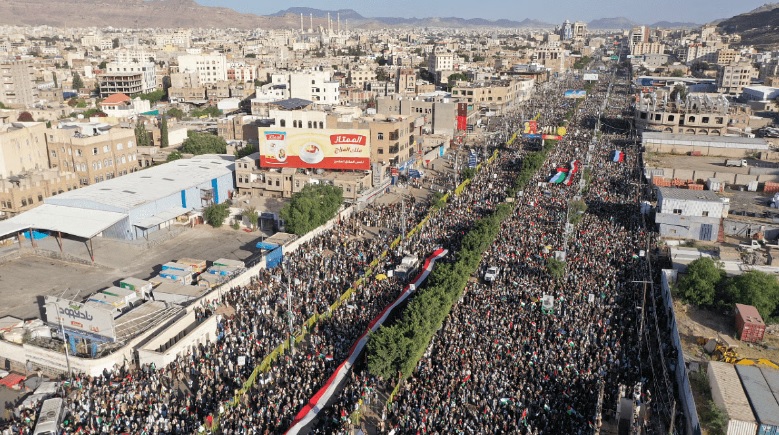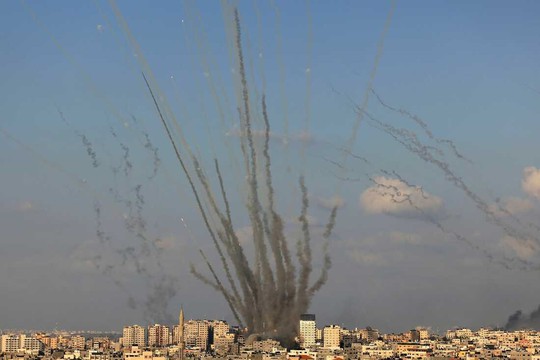Photo: AFP
The war in West Asia puts the participants and their supporters, including those not involved, in a very difficult situation, writes Kanwal Sibal, a retired Indian foreign secretary and former Ambassador to Russia between 2004 and 2007, who also held ambassadorial positions in Turkey, Egypt, France and was Deputy Chief of Mission in Washington DC.
Israel has no doubt suffered a national trauma, with a large loss of civilian lives at the hands of Hamas terrorists and the failure to prevent it due to a serious intelligence failure. Israel is seeking vengeance.
Israel’s position is further complicated internally and externally by polarized domestic politics. Repeated elections, unstable coalition governments, frequent changes in leadership, months of street protests against Prime Minister Benjamin Netanyahu’s decision to introduce judicial reforms – which many see as threatening Israeli democracy – may in part explain why the Hamas carnage caught the Israelis by surprise.
The US, the principal supporter of Israel, and traditionally the dominating external power in West Asia, is facing a major dilemma. Many reasons – geopolitical, humanitarian, and the influence of powerful lobbies – compel the US to support Israel. At the same time, a wider conflagration in West Asia risks drawing the US into another unwanted war in the region. To prevent this, the US has sent two aircraft carrier groups and a marine formation to the Mediterranean. The intention is to deter the Lebanese Hezbollah from opening another front against Israel, as this could potentially lead to Iran and Syria getting involved.
While it publicly expresses full solidarity with Israel, the US has to be careful on the humanitarian front, which is why it has pressed Israel to provide water to southern Gaza and has pushed for some humanitarian supplies to enter Gaza from Egypt. Whether Israel can be dissuaded from launching a ground invasion of Gaza is unclear. If Israel does go ahead, it would appear – rightly or wrongly – that Biden green-lit it. This would create a backlash against the US in the Islamic world. If Israel does not go ahead, it would politically expose the ruling Israeli government to a backlash by far-right elements in the country.
That Biden chose to visit the area suggested that the earlier tour of State Secretary Antony Blinken to Israel, Egypt, Jordan, and Saudi Arabia had not succeeded in finding a way to prevent the situation from worsening. Unfortunately for Biden, the hospital attack in Gaza subverted his visit and the planned summit with Jordan, Egypt, and the Palestinian Authority was called off by Jordan's monarch. Street pressure in the Arab world, indeed the Muslim world, has made it politically risky for Arab regimes to confer under US tutelage. This has been a personal political blow to Biden, as well as the US role in the region. That the US was alone in vetoing a Security Council resolution by Brazil in favor of a humanitarian pause to allow the flow of aid into the territory increases the reputational loss of the US in the Muslim world.
The UN Security Council has once again proven to be ineffective in dealing with security issues. UN Secretary-General António Guterres has seen his low-keyed role confined to humanitarian aid issues. That he was physically present at the Rafah border in Egypt to supervise a very limited and inadequate flow of humanitarian aid sends its own message about the diminution of the UNSG’s role.
The Arabs too are placed in an awkward situation. Their support to the Palestinian cause has waned over the years. The political acceptance of Israel has grown, to the point that the UAE, Bahrain, and Morocco have – as part of the US-promoted Abraham Accords – established diplomatic ties with Israel. Saudi Arabia was in intensive negotiations with the US on normalizing its ties with Israel subject to the US fulfilling its security and some other demands. The Saudis have officially put this process on hold. Saudi Arabia deeply opposed to Hamas as a terrorist organization with ties to the Muslim Brotherhood. This explains why Saudi Arabia’s statements on the Israeli-Hamas conflict have been moderate, which is the case of UAE too, which is also strongly opposed to Hamas. Both Gulf monarchies want to focus on economic development issues, modernize their economies, moderate their Islamic image, part of which has been the willingness to make Israel part of realizing these ambitions.
Significantly, Qatar and Türkiye have strong links with Hamas, as their leaders have strong ties to the Muslim Brotherhood. Qatar, in fact, hosts the top Hamas leadership. It has funnelled a lot of money to Hamas under Israeli watch, and now is being used as an intermediary to effect a release, if possible, of Israeli hostages.
Egypt is resisting pressure to allow Gazans to seek “temporary” humanitarian refuge in the Sinai desert. Egypt has burnt its fingers with Hamas before and fears its presence in Sinai will revive the problem of terrorism infesting this area. Besides, it is well aware that “temporary” refuge could well become a more permanent one.
Iran is blowing hot and cold. It is hostile to the state of Israel and supports both Hamas and the Hezbollah. While it denies having any hand in the brutal terrorist attacks by Hamas against Israel, it is warning against the conflict spreading if Israel continues its unrestrained bombardment of civilians in Gaza, warning that this could bring Hezbollah into the fray, with all the ensuing dangers. Most significantly, the Iranian foreign minister has visited Saudi Arabia (besides Lebanon) to discuss the gravity of the situation. This shows how much the political landscape in this region has changed, and this at the cost of US influence.
Russia has become a powerful actor in West Asia with its presence in Syria, as well as its close ties with Saudi Arabia and Iran. It moved a resolution in the UN in favor of a humanitarian ceasefire in Gaza, release of all hostages, aid access and safe evacuation of civilians, but it could not be passed. In President Vladimir Putin’s view, the only solution to the crisis enveloping the region is a two-state solution, and he hopes that this crisis would compel this outcome. On the other hand, this conflict draws attention away from the Ukraine issue, where a degree of fatigue in supporting Ukraine in US and European political and public opinion is setting in.
China has taken a robust position in favor of Palestine, advocating restraint, ending hostilities to protect civilians, condemning all acts that harm civilians, opposing all acts that violate international law and calling for Palestinian statehood. However, it has not condemned Hamas
India too is an awkward position. It has roundly condemned the terror attacks against Israel, expressed solidarity with Israel more than once, but has also restated its established position in favor of a sovereign, independent, and viable Palestinian state. India has excellent ties with Israel and the Arab world, which it must preserve. India had profited from the Abraham Accords to establish the I2U2 grouping (India, Israel, US and UAE) with economic cooperation in view. The India-Middle East-Europe Corridor, announced at the G20 summit in New Delhi, envisioned Israel’s Haifa port as the staging point for connecting with Greece. Bot these projects will be put on hold for now, Kanwal Sibal concludes.
 Yemenis gather during a pro-Palestinian protest in Sanaa, Yemen on 20 October, 2023
Yemenis gather during a pro-Palestinian protest in Sanaa, Yemen on 20 October, 2023
Photo: REUTERS
A show of unity by the Arab world in the form of its strong condemnation of Israel’s continuing strikes in Gaza could delay further normalisation of ties between Israel and its neighbours in the Middle East, academics and public policy experts based in the Middle East have told ThePrint.
Horrific visuals of the attack by Hamas on 7 October have been overtaken by those of the death and destruction caused by Israel’s strikes in Gaza.
“Arab leaders are in a real state of panic. In the eyes of their people, they are seen crippled and not rising up to what’s expected from them. The leaders of the countries closer to the war, specifically Egypt and Jordan, are the most nervous,” Khaled Al-Hroub, a professor in residence of the faculty of liberal arts at Northwestern University in Qatar, tells ThePrint.
He adds that “all efforts by Israel and the U.S to marginalise the Palestine cause have collapsed” and that this will give more space to the Arab leaders to step up their emphasis that a solution for the Palestinian cause is the “only entry point for stability in the region”.
On Tuesday, the Hamas-run health ministry in Gaza reported at least 471 dead after a blast tore through the Al Ahli Arab hospital.
In Beirut, Lebanese security forces used tear gas and water cannons to disperse protesters demonstrating near the US Embassy, while elsewhere in the city thousands mobilised by a call from Hezbollah gathered waving Palestinian flags, according to reports.
In Istanbul, a reported 80,000 protestors gathered outside the Israeli consulate — a few even attempted to storm the consulate armed with sticks, stones, torches and fireworks. Demonstrations were also reported to have been held near the US consulate in Istanbul.
In Rabat, Morocco, the Israeli ambassador and his staff were repatriated after calls for a mass demonstration were seen circulating throughout the North African nation, reported Jerusalem-based Times of Israel.
The immediate result of these protests can be seen in the changing tone of statements from countries in the Middle East.
As ThePrint reported earlier, the UAE, which normalised ties with Tel Aviv in 2020 and since became a partner in the I2U2 forum — Israel, India, the UAE and the US — called for an ‘immediate halt’ of the conflict and condoled the death of Israelis. Abu Dhabi was also among the first to condemn the “Israeli attack that targeted the Al-Ahli Baptist Hospital”.
Saudi Arabia, which earlier called for an ‘immediate halt’ to escalation, strongly condemned the hospital blast, calling it a “heinous crime” committed by “Israeli occupation forces,” in a post on X (formerly Twitter).
read more in our Telegram-channel https://t.me/The_International_Affairs

 11:53 23.10.2023 •
11:53 23.10.2023 •























